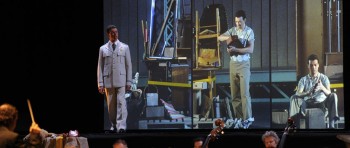Melbourne Festival: After Life
There’s still an odd belief that capital A Arty Farty festivals should open with an opera. Opera is grand and epic and shatters crystal glasses with high Cs to prove its power. So why open the Melbourne Festival with a semi-staged version of an intimate opera in a cavernous theatre that ensures that most of the audience have no chance of experiencing the truth of this work?
After Life is by Michel van der Aa from the Netherlands. At your death, you have to choose one memory, one moment to spend your eternity with. Wow! I don’t know if it’s possible to watch this and not try and find that one memory for yourself. What memories will you lose? What if it’s so painful that an eternity with it is unbearable? How do you choose? My memories of this show are already the post-show discussions about memories.

With live and filmed performers, After Life follows the struggle of some newly dead to choose their memory. In a way station between Heaven and Earth, they search through a pallet of their stuff and are helped by beige-suited staff to create their eternity, and one guide’s eternity changes when his memories collide with those of a new soul. I think I might have really loved this, if I had a chance to see the opera that van der Aa envisioned.
It’s really hard to discuss a work that you can hardly see. I was in the gods and didn’t have the luxury of being able to see the detail of the pallets of memories, the chance to connect to the characters driving the story or enjoy the subtlety of the performances. Hell, I could barely figure out who was singing! I honestly believed that a bass and a soprano were the same person for a while.
I could enjoy the luxury of empty seats for my handbag and was free to wiggle because my head wasn’t obliterating the view of the person behind me. I was also able to see the steady stream of runners and the light show of phone time checking.
(I don’t care how f’ing bored you are, TURN YOUR GODDAM PHONE OFF IN THE THEATRE.)
Let’s start something. Next time you’re in a theatre, before the show starts, have a chat to the people next to you. As theatre goers, they are probably someone you’d like to talk to, but after chatting about wine and seeing if you have better seats that B-list celebs in the audience, ask to see their smart phone, compare it to yours and have a competition to see whose turns OFF the fastest. If they don’t play the game, grab their phone and sit on it until after the applause. If it vibrates, that’s a bonus for you. If you HAVE to check the time; get a watch.)
Rant over. Next rant begins
Today in festival office today, folk will be reading the Twitterati’s comments like “atrocious” and tut-tutting about mindless bloggers and selfish critics who just don’t “get it”. But you weren’t sitting where you could see people leave or listening to the sighs, which translated to “would anyone notice if I played Angry Birds” – and the people who talked to you at the after party were being polite. The things I heard said about this show at the after party! I had a dud experience, but I might be the best shot for a good review.
I love arty farty contemporary opera. I love John Adams like I love Stephen Sondheim and David Bowie and The Go-Betweens. Favourite festival opera ever: Einstein on The Beach. Remember the response to Tomorrow, in a Year in 2010? The damnation was poetic. Melbourne hated this work and generally resented their time spent watching it. Last night, I heard comments that After Life was worse! But I adored Tomorrow, in a year. I bought the CD, it was my favourite piece of theatre for 2010. I really am the best chance for a good review.
But how can I fairly comment on something that was so distanced from its audience? It was like watching Star Wars on a portable black and white telly with a microwaved tv dinner compared to seeing at a full cinema on a giant screen in 1978 with a choc top.
The Regent is a magnificent theatre, but it’s not the place for this piece. Only the first handful of middle rows have any chance of experiencing After Life as it’s meant to be. Being very generous, that’s less than quarter of the audience. I chatted with a reviewer who was in row L downstairs; his experience wasn’t much better than mine.
But back to the art. Musically, van der Aa’s score loves the sound of voices and it was a treat to hear such exquisite voices, but the atonal sound and recitative was constant and didn’t match the drama or tone on the stage. I can’t remember any of it; not buying the CD. Again, the venue was so wrong for this music and in the right space, I have no doubt that its delicacies would be heard.
Then there was the film. As a semi-staged version, we didn’t see what it was meant to look like. Opera and music are about singing what you can’t say, so why not sing it all? A child singing about his lost dog would have been heartbreaking. A child talking about his lost dog on film is cute. The climax is a man destroying his pallet of memories and realising that his life was more than he’d ever known. Dramatically powerful, structurally perfect, emotionally painful and cathartic. This scene is on screen. Filmed on an empty stage. If this were live, it would be astonishing and I can’t imagine how the choice to have it on film was made.
I’ve just had a look on the YouTube to see what After Life is meant to be like. Even a grab on a computer shows why this work was chosen. It’s exquisite (if this becomes a pull quote, I’ll go around with a Sharpie and insert a “not” on every poster). The film merges seamlessly with the live action; those singers can act (and that’s what they look like); the design is delicate, funny and evocative; and the music seems as natural as breathing. Even that climax works.
Putting a half-arsed version of After Life in The Regent is unfair to its creators and its performers and an insult the audience who love and support this festival.

